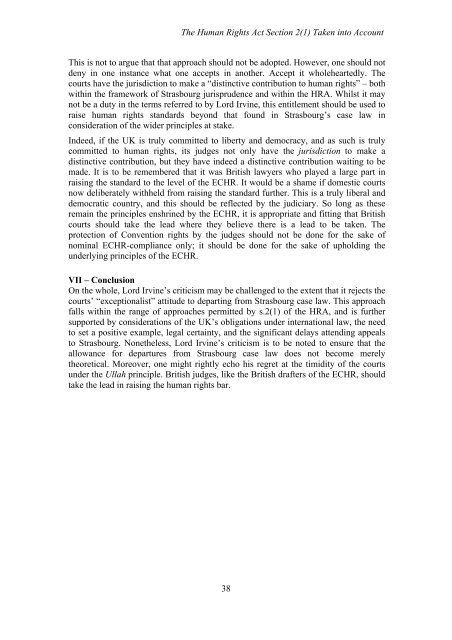Open UKLSR Volume 1(2) - Uklsa
Open UKLSR Volume 1(2) - Uklsa
Open UKLSR Volume 1(2) - Uklsa
You also want an ePaper? Increase the reach of your titles
YUMPU automatically turns print PDFs into web optimized ePapers that Google loves.
The Human Rights Act Section 2(1) Taken into Account<br />
This is not to argue that that approach should not be adopted. However, one should not<br />
deny in one instance what one accepts in another. Accept it wholeheartedly. The<br />
courts have the jurisdiction to make a “distinctive contribution to human rights” – both<br />
within the framework of Strasbourg jurisprudence and within the HRA. Whilst it may<br />
not be a duty in the terms referred to by Lord Irvine, this entitlement should be used to<br />
raise human rights standards beyond that found in Strasbourg’s case law in<br />
consideration of the wider principles at stake.<br />
Indeed, if the UK is truly committed to liberty and democracy, and as such is truly<br />
committed to human rights, its judges not only have the jurisdiction to make a<br />
distinctive contribution, but they have indeed a distinctive contribution waiting to be<br />
made. It is to be remembered that it was British lawyers who played a large part in<br />
raising the standard to the level of the ECHR. It would be a shame if domestic courts<br />
now deliberately withheld from raising the standard further. This is a truly liberal and<br />
democratic country, and this should be reflected by the judiciary. So long as these<br />
remain the principles enshrined by the ECHR, it is appropriate and fitting that British<br />
courts should take the lead where they believe there is a lead to be taken. The<br />
protection of Convention rights by the judges should not be done for the sake of<br />
nominal ECHR-compliance only; it should be done for the sake of upholding the<br />
underlying principles of the ECHR.<br />
VII – Conclusion<br />
On the whole, Lord Irvine’s criticism may be challenged to the extent that it rejects the<br />
courts’ “exceptionalist” attitude to departing from Strasbourg case law. This approach<br />
falls within the range of approaches permitted by s.2(1) of the HRA, and is further<br />
supported by considerations of the UK’s obligations under international law, the need<br />
to set a positive example, legal certainty, and the significant delays attending appeals<br />
to Strasbourg. Nonetheless, Lord Irvine’s criticism is to be noted to ensure that the<br />
allowance for departures from Strasbourg case law does not become merely<br />
theoretical. Moreover, one might rightly echo his regret at the timidity of the courts<br />
under the Ullah principle. British judges, like the British drafters of the ECHR, should<br />
take the lead in raising the human rights bar.<br />
38


